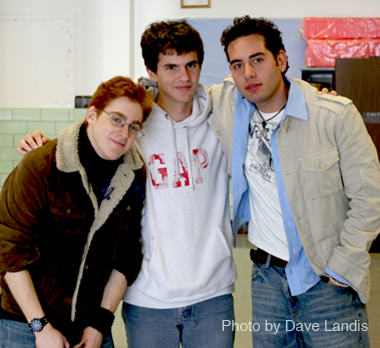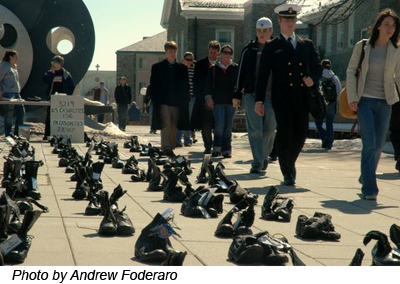Franconia Conference Staff Blogs
Check out the staff blog updates on www.mosaicmennonites.org throughout the summer, as various staff and summer interns will be sharing their thoughts on questions emerging from their work with the conference. New entries will be highlighted on the website’s homepage, while a full list of all previous blogs can be accessed under the “Publications” tab of the site.
Responding to Justapaz break-in
On June 14, 2007 the Bogota, Columbia office of Justapaz (Christian Center for Justice, Peace, and Nonviolent Action) was broken into and several computers with very sensitive information were stolen. This is one in a series of politically motivated break-ins of human rights organizations. Janna Hunter Bowman, Documentation and Advocacy Coordinator of Justapaz and native of Bally (PA), has been helping to finalize plans for a Justapaz delegation to respond to the robbery and accompany affected churches. Justapaz will be holding the delegation in Bogota alongside Witness for Peace from August 17-25, 2007. This will be an opportunity to learn about the peace ministries of Mennonite and other Protestant churches and support their work. It is hoped that representatives from Franconia Mennonite Conference churches will be present at the delegation and take back their learnings and experiences to their home congregations. For anyone interested in this important opportunity, contact Krista Ehst at kehst@mosaicmennonites.org.


 I look forward to the vast array of experiences that await me at New Hope. I hope to form meaningful relationships with people and listen to the stories of others, learning from those around me. I anticipate that the new setting will give me new ideas, new energy, and a renewed hope for what the Mennonite Church is and will become. I look forward to this opportunity as I explore further what it means to be part of the Anabaptist/Mennonite church and take part in God’s exciting work in the world.
I look forward to the vast array of experiences that await me at New Hope. I hope to form meaningful relationships with people and listen to the stories of others, learning from those around me. I anticipate that the new setting will give me new ideas, new energy, and a renewed hope for what the Mennonite Church is and will become. I look forward to this opportunity as I explore further what it means to be part of the Anabaptist/Mennonite church and take part in God’s exciting work in the world.

 Life seems to come at you faster than you can blink. I closed my eyes for one second as I was on a bicycle climbing the continental divide and when I opened my eyes I was standing among people at a vigil in Pittsburgh.
Life seems to come at you faster than you can blink. I closed my eyes for one second as I was on a bicycle climbing the continental divide and when I opened my eyes I was standing among people at a vigil in Pittsburgh. I like new experiences – things that pluck me from my comfort zone and force me to learn and grow. This is one of the reasons I chose to do a term of service with Mennonite Voluntary Service. I decided to assist with policy work around workers rights and workplace justice at an organization called the Employment Justice Center in the District of Columbia. I graduated with an undergraduate degree in Psychology from
I like new experiences – things that pluck me from my comfort zone and force me to learn and grow. This is one of the reasons I chose to do a term of service with Mennonite Voluntary Service. I decided to assist with policy work around workers rights and workplace justice at an organization called the Employment Justice Center in the District of Columbia. I graduated with an undergraduate degree in Psychology from